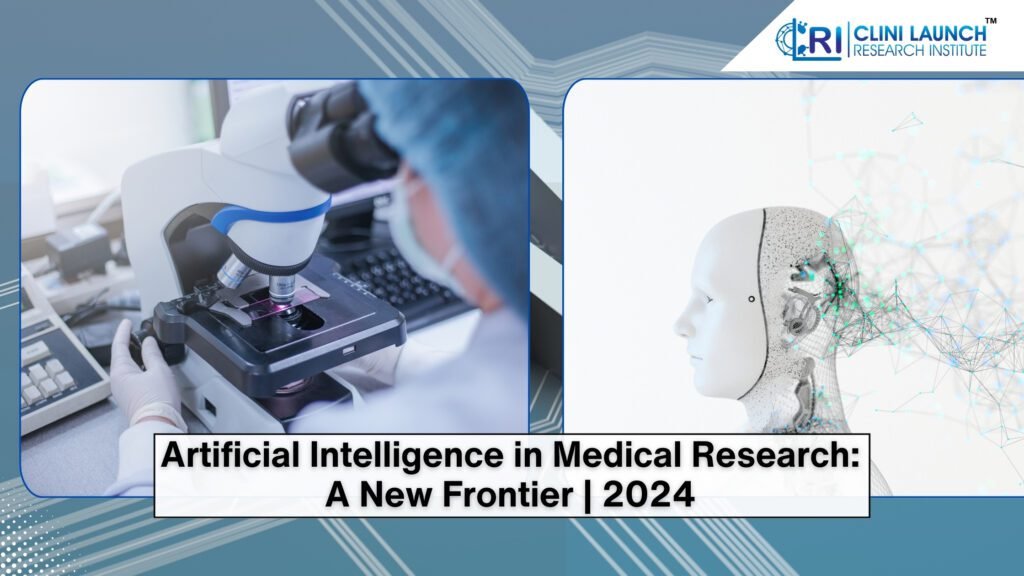Artificial intelligence in medical research is being revolutionized, changing the entire healthcare landscape. The intricacies of large datasets, complicated biological systems, and the challenging process of drug development have long bedeviled researchers. The development of efficient medicines for many illnesses has been severely hampered by these obstacles.
Traditional research methodologies rely on manual human data processing and interpretation. More to all of this they are not designed to handle the size and complexity of contemporary datasets. The process of extracting valuable ideas from this enormous body of data is labor-intensive and time-intensive, which ultimately slows down the evolution of medicine research.
Artificial Intelligence in Medical Research
The realm of medical research is undergoing a profound transformation, ultimately fueled by an unprecedented surge in data generation. From genetic sequences and medical imaging to electronic health records (EHRs), the volume and complexity of data available to researchers are expanding at an exponential rate in today’s times. While offering enormous promise for ground-breaking discoveries, this data flood has also brought up several serious obstacles.
Artificial intelligence (AI) is a new frontier that is emerging to address these difficulties. AI can uncover hidden patterns and connections in medical data by utilizing sophisticated algorithms and computer capacity. This might hasten the development of novel therapies and cures.
The Challenge of Medical Data

Data in the medical profession is being produced at an incredible rate. Large volumes of genetic data, crucial for understanding disease susceptibility and identifying potential therapeutic targets, are generated through genomics research. Medical imaging technology produces high-resolution images, essential for detailed analysis of physiological functions and anatomical structures. Furthermore, EHRs captures a multitude of patient data, including medical history, diagnosis, prescriptions, and lab results.
While this data represents a goldmine of information for medical research, there are many challenges that hinder its effective utilization too. Agendas like data silos, inconsistent formats, and privacy concerns complicate data integration initiatives but the sheer volume of data overwhelms conventional statistical methods, making it all the more difficult to extract meaningful insights and discover hidden patterns.
Creative solutions are needed to solve these issues and realize the full potential of medical data. In order to get past these obstacles, artificial intelligence in medical research appears to be a potential solution. Through the use of machine learning for research insights and big data analytics, researchers may expedite the development of novel treatments and cures by delving deeper into intricate datasets and identifying patterns.
As a result, researchers frequently struggle to extract usable insights from massive amounts of data. The limits of manual analysis become more evident as the complexity of medical research increases.
To solve these issues and maximize the value of medical data, innovative solutions are necessary. Artificial intelligence in medical research appears to be a potential solution to overcoming all these old worries. By leveraging machine learning and big data analytics in healthcare, researchers may dive deeper into complicated information, spot trends, and speed up the development of novel treatments and cures.
AI – A Catalyst for Medical Breakthroughs

The combination of enormous datasets and enhanced computer capacity has signaled a new era in medical research. Artificial intelligence (AI), notably machine learning for research insights, is driving this shift. By allowing computers to learn from data without explicit programming, AI enables researchers to glean new insights from previously daunting datasets.
CliniLaunch recognizes the transformative potential of artificial intelligence in medical research and offers specialized training to equip professionals with the skills to harness its power. From accelerating drug discovery to enhancing disease diagnosis, AI is driving groundbreaking advancements in healthcare. By mastering machine learning for research insights, individuals can contribute to improving patient outcomes and shaping the future of medicine.
Harnessing the Power of Big Data for Medical Breakthroughs

Data mining in big data analytics is transforming medical research by extracting significant trends and patterns from large databases. CliniLaunch recognizes the revolutionary power of big data and provides specialized training to upskill professionals with the necessary skills to optimize treatments in the field.
Researchers may dive deeply into complicated data using advanced analytics approaches, revealing hidden patterns that fuel innovation. AI-powered technologies make it easier to analyze patient records, genetic information, and clinical trial data, allowing for trend discovery, result prediction, and therapy optimization. Big data analytics aims to accelerate medication discovery. By searching through massive chemical databases, researchers may find prospective medication candidates, forecast their efficacy and safety, and simplify the development process. This data-driven method allows patients to receive life-saving drugs sooner.
Click here to learn more about the AI & ML course at CliniLaunch
Precision Medicine and AI
Precision medicine aims to tailor medical treatment to patients characteristics of each patient. This approach is transforming healthcare by optimizing treatment plans and improving patient outcomes.
AI plays an important role in precision medicine by simplifying patient classification and biomarker discovery. AI can use machine learning algorithms to analyze massive volumes of patient data (as data mining in medicine) and find subgroups with similar features, hence optimizing therapy choices. Furthermore, AI expedites the finding of biomarkers, which are molecular indications of illness or therapy response and are critical for designing personalized medicines.
While the potential benefits of AI in precision medicine are enormous, ethical concerns must be carefully considered. CliniLaunch emphasizes the need for ethical AI adoption to protect patient privacy, data security, and algorithmic fairness with upskilling.
Overcoming Challenges and Future Outlook
While the potential for artificial intelligence in medical research is enormous, certain hurdles must be met. Data privacy and security are top priorities, since sensitive patient information must be safeguarded. Furthermore, algorithmic bias might provide erroneous or discriminating results, impeding the equal use of AI.
To address these difficulties, strong data governance structures and ethical principles are required. Continuous monitoring and assessment of AI systems are required to detect and correct biases.
Furthermore, investing in AI education and training is critical for creating a competent workforce capable of developing and deploying AI solutions efficiently. CliniLaunch emphasizes the need for responsible AI development and application to prevent these hazards. And by referring to application, we mean upskilling to grow one’s expertise and ultimately contribute to the goal of better patient care.

Krishna Talreja
Dynamic content marketing strategist with expertise in brand storytelling and content creation. Adept at managing diverse content projects, driving engagement, and enhancing brand visibility across multiple platforms.






Usually I do not read article on blogs however I would like to say that this writeup very compelled me to take a look at and do it Your writing style has been amazed me Thank you very nice article.
Thanks for sharing. I read many of your blog posts, cool, your blog is very good.